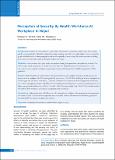Please use this identifier to cite or link to this item:
https://hdl.handle.net/20.500.14356/1850| Title: | Perception of Security By Health Workforce At Workplace In Nepal |
| Authors: | Neupane, M Prajapati, R Baral, B Karki, K B |
| Citation: | Prajapati R, Baral B, Karki KB,N. M. (2013). Perception of Security By Health Workforce At Workplace In Nepal. Journal of Nepal Health Research Council. https://doi.org/10.33314/jnhrc.v0i0.381 |
| Issue Date: | 2013 |
| Publisher: | Nepal Health Research Council |
| Article Type: | Special Issue Articles |
| Series/Report no.: | May-Aug, 2013;381 |
| Abstract: | Abstract Background: In Nepal, the relationship of health worker and patient or community people is now deteriorating and the security and safety of health worker is becoming emerging issues. The poor relationship between community people and health worker is hampering the health service especially in rural setting. This study was aimed at finding the security perception and situation of health workforce in Nepal. Methods: A cross-sectional descriptive study was conducted using both quantitative and qualitative methods. Out of 404 sample health institutions, 747 health workforce from 375 health institutions were interviewed (<10% non-response rate) using the probability proportionate to size method as per World Health Organization (WHO) guidelines. . Results: Nearly 168 (23%) of health workers felt some level of insecurity at their workplace. Mostly, doctors felt insecure at their workplace 24 (30%) and argued with service users , 26 (32.50%). Feeling of security was highest in central region 160 (83.30%). Nationwide, 121 (16%) of health workers faced some level of arguments with service users, which was highest in Tarai 64 (18.08%). Of the total harassment, both gender based and sexual harassment was higher among female health workers [20 (62.5%) and 13 (56.5%) respectively]. Only, 230 (30.7%) of health workers who suffered from workplace accidents got compensation and treatment. Conclusions: Higher proportions of health workers feel insecurity at workplace whereas provision of compensation was minimal. There is a need of strict implementation of Security of the Health Workers and Health Organizations Act, 2066 (2009) for effective health service delivery. |
| Description: | Special Issue Articles |
| URI: | http://103.69.126.140:8080/handle/20.500.14356/1850 |
| ISSN: | Print ISSN: 1727-5482; Online ISSN: 1999-6217 |
| Appears in Collections: | Vol. 11 No. 2 Issue 24 May - Aug, 2013 |
Files in This Item:
| File | Description | Size | Format | |
|---|---|---|---|---|
| 381-Article Text-405-1-10-20131127.pdf | Fulltext Download | 741.39 kB | Adobe PDF |  View/Open |
Items in DSpace are protected by copyright, with all rights reserved, unless otherwise indicated.
